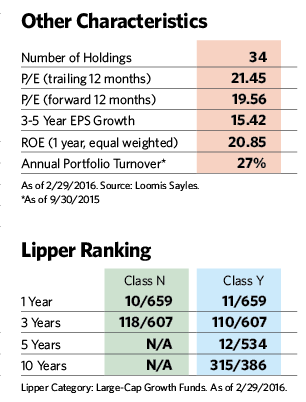“We believe the long-term secular transition to e-commerce is still in its early stages of growth,” Hamzaogullari says. “With its growth more than two times that of the e-commerce market and several multiples higher than the low-single-digit growth in the overall retail market, Amazon continues to take market share.”
The sustainable competitive advantage for Visa, another top holding, is the credit card company’s well-recognized brand and massive global network. The company’s advantages pose high barriers to competitors entering the market: It has relationships with more than 16,000 card-issuing banks, boasts more than 2.3 billion cardholders and is accepted by more than 35 million merchants worldwide.
More than two-thirds of its client banks have been working with Visa for over 10 years and have typically signed long-term contracts of seven to 10 years. Thanks to its strength in the growing digital payments area, Visa has seen payment volume grow 9% to 11% in recent years. With a significant presence in parts of the world where the penetration of electronic payments is currently minimal, Visa should be able to generate double-digit cash-flow growth.
Alibaba, a leading Chinese online and mobile commerce company, has been a fund holding since its IPO in the third quarter of 2014, and it is poised to take advantage of the growing preference of consumers for e-commerce over physical stores. China has a population of 1.4 billion people, nearly half of whom are Internet users. Like Amazon, Alibaba’s inventory-light business model amps up cash flow and profit margins.
Management owns a significant stake in the business, and last year initiated a $4 billion share repurchase program. And with investors worried about slowing growth in China, the stock has been driven to levels that represent a significant discount to Hamzaogullari’s estimate of intrinsic value.
Oracle, another top holding in the Loomis Sayles fund, has a strong intellectual property portfolio, unique products and a large consumer base. Its customer renewal and retention rates top 90%, creating high barriers to entry for competitors. Founder Larry Ellison continues to run the company with a long-term time horizon, and Hamzaogullari believes the company’s investments in its database and applications businesses over the last five years, as well as its development of new cloud-based products, will benefit the company in the future.
Oracle is undergoing a transition from a business model with up-front software licensing and maintenance revenue to a cloud computing, subscription-based model that recognizes revenue over a longer period of time. He believes the shift to the cloud model will lead to faster revenue growth over time as customers recognize its value. Because market expectations for revenue and cash flow are below fund estimates, the company’s shares are trading at a steep discount to Hamzaogullari’s estimate of intrinsic value. 









